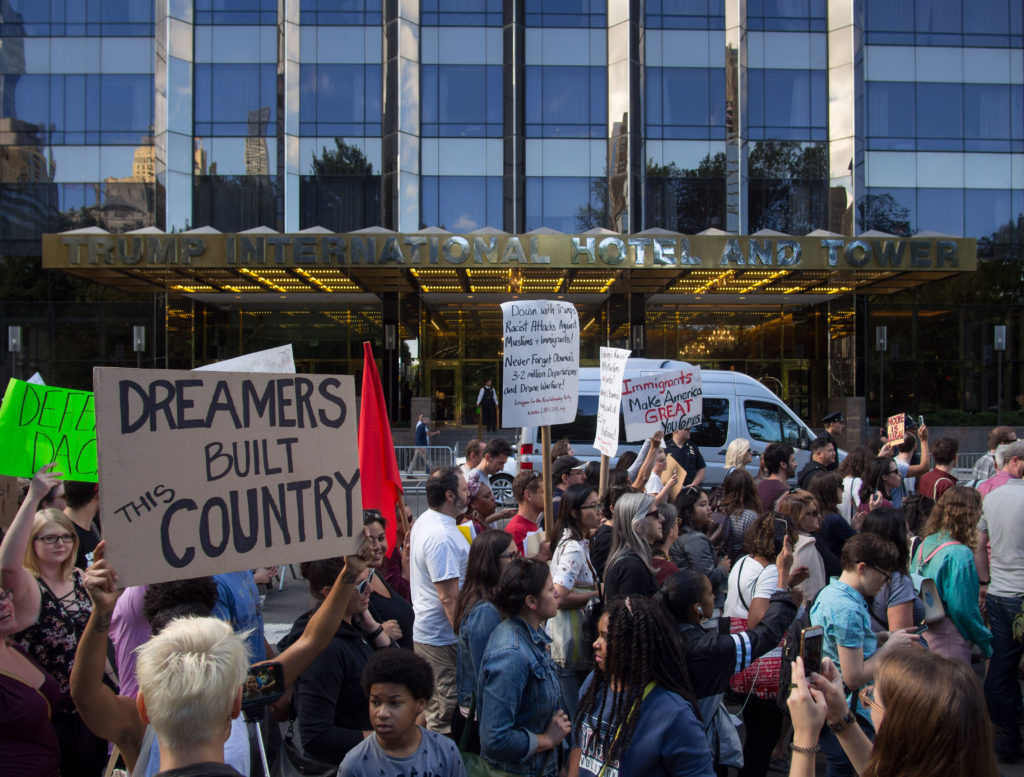By Elissa Choi
The Mirror
Feature Editor
By Sara Kuchimpos
The Mirror Staff
“*Trump withdrawing DACA was a punch in the stomach, but when I see so many youth organizing, I get a sense of relief because now we can fight for something permanent together.”
FEATURE
The Death of DACA: What’s Next?
September 29, 2017
FEATURE: President Trump’s plan to withdraw DACA will cause detrimental effects on the futures of thousands of young Dreamers.
They were brought here from foreign lands by their parents when they were babies.
They grew up in the United States, going to American schools and speaking English.
For most, the United States is the only home they have ever known.
They are the Dreamers, hundreds of thousands of undocumented young people who participate in a program called DACA–Deferred Action for Childhood Arrivals–that gave them special immigration status.
For taking part in the program, they are protected from deportation, receive access to higher education, and eligible for work permits and social security numbers in exchange for registering with the federal government.
Many Dreamers have earned college degrees, pursued careers in a sweeping array of fields, and begun families of their own. But now their futures and their security are in limbo.
President Trump ordered an end to DACA on Sept. 5—breaking the government’s promises and leaving the Dreamers with an uncertain future that might include deportation.
The Trump administration has allowed a six-month delay for current recipients of DACA, or Dreamers. Unless Congress intervenes, President Trump’s decision to withdraw the program will jeopardize the futures of 800,000 Dreamers.
Enacted in 2012 as an executive order under the Obama administration, the primary focus of the program has been to protect undocumented minors who arrived at the United States prior to their sixteenth birthday.
DACA relies on the concept of juvenile justice, which states that children at or under the age of 16 cannot be tried as an adult in a court of law because they are unaware of the extent of the crime they have committed. Therefore, their status as unauthorized immigrants cannot be held against them as a crime with intent.
To remain eligible for DACA, Dreamers must be employed or enrolled in school and be free of any misdemeanor offenses. Any instances of domestic violence, burglary, or driving under the influence will harm their chances of remaining in the program.
DACA is not a path to citizenship. After reaching the age of thirty-one, Dreamers are no longer protected by DACA and may be subject to deportation.
Dreamers are also not eligible to apply for Pell grants or federal scholarships.
Within the five years of the program’s initiation, the presence of the approximately 800,000 recipients has had an impact on the nation, and even more so in heavily populated border states, like California and Texas.
Their influences and contributions to society have been permanently etched into American society, and their departure will surely impact the nation, economically and socially.
If President Trump ends DACA, the Dreamers face the possibility of deportation.
Because they registered with the program and willingingly disclosed substantial sensitive personal information, a federal database already exists giving officials easy access to their addresses, social security numbers and employment and school locations. This makes them sitting ducks for Immigration and Customs Enforcement (ICE) deportation raids.
The end of DACA may have severe economic consequences as well.
Not only will the government spend $60 billion solely on deporting Dreamers, but the U.S. economy will lose about $460.3 billion in total over the next decade, according to government studies.
The loss of 800,000 students and workers may create a gaping hole in Medicare and Social Security funds as well. Medicare fund cuts promised by President Trump may become even greater with the deportation of Dreamers, who contribute more than $24.6 billion to the health-care program.
“We pay taxes, contribute to this country economically, culturally, and don’t ask for anything besides pursuing a higher education for the betterment of ourselves,” said a college DACA recipient, who didn’t wish to be identified.
“DACA allowed me to view my reality of going to college,” said a DACA recipient still going to high school. “I realized that although I wasn’t able to receive as many benefits as a U.S citizen, DACA allowed me to have a workers permit and generate my own sustainability,”
Unless Congress devises an alternative program within the six-month window Trump has allowed, DACA recipients are certain to lose their legal status and face the risk of deportation.
Advance Parole, a program that allows Dreamers to travel internationally, has also been stopped for Dreamers. Without permission to visit their homelands for educational and humanitarian purposes, there is a great possibility that the next time Dreamers see their homelands again will be as deportees. Dreamers will be forced back into countries they don’t remember, where they will have to readjust to a culture and language that in many cases are alien to them.
Since Trump’s announcement, new DACA applicants are being turned away. And for current DACA participants, all sense of security is gradually deteriorating as the clock ticks down for Congress to act.
“The feeling that I got when Mr. Trump rescinded DACA, was not that of many. I believe that in order to have something more permanent, DACA had to come to an end. At the same time, we are risking everything that we have worked for through these past years. It’s coin toss, we are giving up on all we have for something better but don’t know if we’ll get back what we want in return,” said the college student.
The Republican majority in Congress seems to support President Trump’s decision to rescind the program, whose constitutionality has been hotly debated in the past.
Many Republicans and Trump supporters have expressed open contempt against Dreamers, claiming that undocumented individuals are lowering wages and taking jobs from more deserving residents and citizens. However, there is little direct evidence to support this view.
With the sensitive topic of Affirmative Action also on the table, Trump supporters have also argued that people who are citizens and not of color are being stripped of the opportunities in higher education. They claim that undocumented students are stealing seats at universities that rightfully belong to legal residents and citizens, and aim to create even more opportunities at institutions for students that are not of color.
“Some words I would say to people who are against DACA would be that it’s not even about race anymore. This is about classism,” said the high school student.
“The top 1% want to stay there and because the poor white population of this country are not well educated, they are brainwashed to thinking that DACA recipients are one reason why they don’t have jobs or aren’t getting the health care they deserve.”
A looming fear resides over participants as they wait for updates on the issue.
President Trump shocked both sides of the political spectrum when he did an abrupt about face and called on Congress to come up with a legislative measure that could potentially grant citizenship for the young immigrants.
A tentative deal Trump discussed in a meeting with Senate Minority Leader Chuck Schumer (D) and House Minority Leader Nancy Pelosi (D) suggests that an acceptable permanent solution to the DACA problem will be reached. But in exchange for assurance of future citizenship, the Democratic leadership must agree to strictly enforced border control.
As Dreamers and their families anxiously anticipate President Trump’s final decision, students of DACA still urge others to stand in solidarity against the removal of DACA and to continue to pursue higher education.
“Get a higher education and if you don’t, always carry the values of this movement to pass on to the next generation because only that way will we overcome these obstacles,” said the college student.


